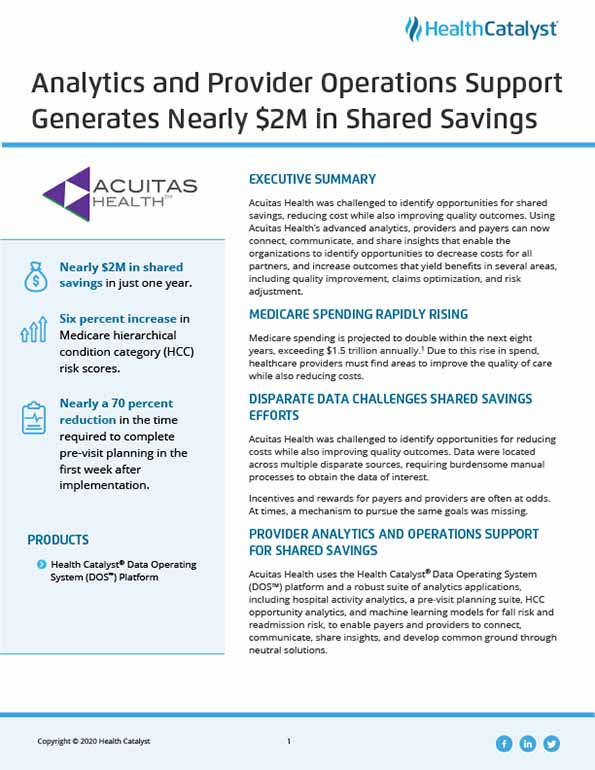Acuitas Health was challenged to identify opportunities for shared savings, reducing cost while also improving quality outcomes. Using Acuitas Health’s advanced analytics, providers and payers can now connect, communicate, and share insights that enable the organizations to identify opportunities to decrease costs for all partners, and increase outcomes that yield benefits in several areas, including quality improvement, claims optimization, and risk adjustment.
Medicare spending is projected to double within the next eight years, exceeding $1.5 trillion annually.1 Due to this rise in spend, healthcare providers must find areas to improve the quality of care while also reducing costs.
Acuitas Health was challenged to identify opportunities for reducing costs while also improving quality outcomes. Data were located across multiple disparate sources, requiring burdensome manual processes to obtain the data of interest.
Incentives and rewards for payers and providers are often at odds. At times, a mechanism to pursue the same goals was missing.
Acuitas Health uses the Health Catalyst® Data Operating System (DOS™) platform and a robust suite of analytics applications, including hospital activity analytics, a pre-visit planning suite, HCC opportunity analytics, and machine learning models for fall risk and readmission risk, to enable payers and providers to connect, communicate, share insights, and develop common ground through neutral solutions.
DOS helps Acuitas Health bridge traditional analytics and technical solutions with clinical and business operations. Using Acuitas Health’s advanced analytics, payers and providers can identify opportunities to decrease costs for both parties, and increase outcomes that yield benefits in several areas, including quality improvement, coding optimization, and risk adjustment.
Acuitas Health uses DOS and closed-loop analytics to integrate data from more than ten disparate systems, improving data access for its partner clinicians. Clinicians receive patient-specific details before the patient visit, supporting clinicians in making data-driven medical decisions and increasing adoption of best practices. The closed-loop alerts are provided to clinicians through the pre-visit planning solution, allowing clinicians to identify opportunities for health maintenance, improve quality and HCC coding.
Acuitas Health uses the HCC opportunity analytics to identify opportunities to increase coding specificity where clinically appropriate. The organization can identify providers who use a generic code for a condition where specific codes may be more accurate, allowing the organization to engage with providers to improve the specificity and accuracy of clinical documentation. The analytics also compares providers to others in the system, and the system average, identifying those providers who may benefit from HCC coding education.
Admission, discharge, and transfer data from the health information exchange (HIE) is leveraged by Acuitas Health to ensure providers are aware of hospital activity for their patients. The organization utilizes machine learning to identify readmission risk, and natural language processing (NLP) to pull text out of alerts and discharge summaries, categorizing the data and defining a framework for intervening to prevent future admissions.
Acuitas Health’s provider analytics and operations approach helped its clients achieve substantial shared savings, including:
Following the stay-at-home orders related to COVID-19, many patients chose not to complete previously scheduled in-person medical care. Acuitas Health observed a dramatic decline in visits overall, a rapid increase in virtual care, and after several months, a significant rebound in visits in general.
Fewer visits meant fewer pre-visit alerts for providers. As visits began to recover, so did the use of the pre-visit alerts, at a faster rate than before COVID-19. Acuitas Health observed a 68 percent increase in the use of the pre-visit planning solution over two months. Pre-visit planning solutions are having a positive effect on outcomes. Acuitas Health has observed higher coding opportunity closure rates where pre-visit planning solution use is higher.
"Discussions about analytics and technology in healthcare are often devoid of the softer side of delivering insights in a thoughtful manner that connects with partners. I do not mean the “type” of dashboard. I mean intellectually building relationships and trust based on competency, and a respect for the subject as a foundation for analytics to ride in on. At Acuitas Health, we blend disciplines and expertise in clinical, technical, business, and statistics to offer an optimal translative service."
- Keegan Bailey, MS, Strategy and Technology Leader
Acuitas Health will continue to expand its use of advanced analytics, helping providers and payers find common ground to improve healthcare quality and reduce costs.


